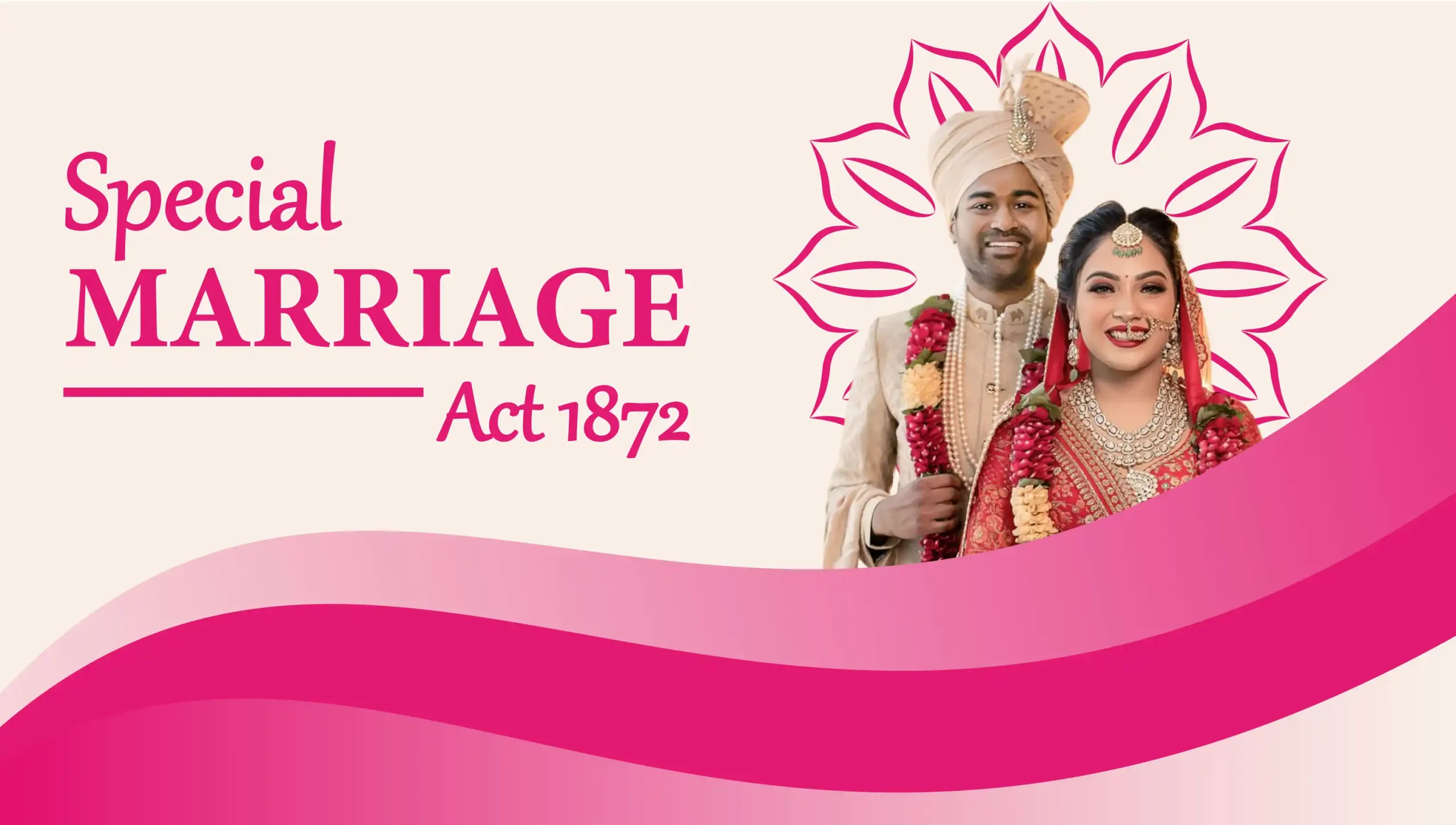Marriage is more than a ceremony. It’s a decision that shapes your entire life. When my partner and I decided to marry, we realized our different religious backgrounds could be a barrier under traditional laws. That’s when we discovered the Special Marriage Act 1872.
This blog is based on our real-life journey with the Bangladesh Special Marriage Act and the Hindu Special Marriage Act. If you’re planning an interfaith or secular marriage, this guide will help you understand the law, the process, the benefits, and the challenges.
Exceptional Marriage Act Overview and Process
The Special Marriage Act 1872 is a civil law that allows individuals of different or no religion to marry legally. This Act was enacted during British rule and continues to be enforced in Bangladesh today.
This law offers a neutral, secular framework for marriage. Unlike religious marriage laws, it doesn’t require religious conversion or ceremonies. Whether you’re a Muslim, Hindu, Christian, Buddhist, or atheist, you can marry under this law without giving up your personal beliefs.
Increasing Popularity of Special Marriages
The 1872 Special Marriage Act is becoming increasingly popular among modern Bangladeshi couples. People want to marry by choice, not by tradition. More and more couples are choosing secular marriages due to personal beliefs, love across faiths, or a desire for gender-equal unions.
We noticed this firsthand at the registrar’s office. Couples from all walks of life—urban, rural, educated, and working-class—applied under the Special Marriage Act 1872 Bangladesh. It’s a growing movement toward freedom and equality in marriage.
Eligibility for Marriage Under the Special Marriage Act
Before we applied, we checked the eligibility criteria. Here are the requirements:
- Both partners must be at least 18 years old.
- Neither can be married at the time of application.
- Both must consent freely and fully.
- At least one party must live in Bangladesh for at least 14 days before applying.
These conditions are straightforward but essential. The conditions of the Special Marriage Act ensure that marriages are legal, consensual, and appropriately documented.
Conditions for Marriage Under the Special Marriage Act
The most essential condition of special marriage act is the public notice period. After submitting your application, your name will be publicly displayed at the registrar’s office for 30 days. During this time, anyone can object to your marriage on legal grounds.
We were nervous about this. While our families were supportive, we had heard stories of strangers filing fake objections. Thankfully, no one opposed our application. But for many, this is a serious, unique marriage act problem.
Benefits of Special Marriage
Getting married under the Special Marriage Act 1872, Bangladesh offered several benefits for us:
- No religious conversion was needed.
- We had full legal recognition of our marriage.
- Equal inheritance and property rights.
- The ability to define our own divorce and custody terms.
- The certificate is valid for international immigration and visas.
It felt right. It respected our beliefs and gave us both legal protection.
Process for Marriage Under the Special Marriage Act
Here’s the step-by-step process we followed under the Special Marriage Act 1872:
1. Submission of Special Act Marriage Registration Form
We submitted the Special Act marriage registration form with our personal details and documents to the local registrar’s office.
2. Notice Period
Our application was displayed publicly for 30 days. This notice allows for legal objections, which must be submitted in writing.
3. Witnesses
After 30 days, we returned to the office with two witnesses, who confirmed our identity and intent to marry.
4. Marriage Registration
We signed the marriage register in front of the registrar and witnesses. We received an official certificate afterwards.
This process was formal, yet emotionally fulfilling. It was our moment—legal, secure, and respected.
Required Documents for Special Marriage
Before you apply, gather all special marriage act required documents:
- National ID or passport
- Birth certificate
- Passport-sized photos
- Proof of address/residence
- Completed the unique marriage registration form
- Affidavit if divorced or widowed
- IDS of two adult witnesses
Double-check all documents for spelling errors and consistency. Incomplete or incorrect paperwork can delay or cancel your application.
Opposition to Marriage
This is one of the more challenging aspects of the process. During the 30-day notice period, anyone can file an objection. If someone believes your marriage breaks the law—due to age, prior marriage, or consent issues—they can raise a legal complaint.
In our case, we were lucky. But we heard stories of families objecting to muslim marriage under special marriage act or Christian-Hindu unions purely for social or religious reasons. These objections can stall your marriage or send it to court for review.
We recommend having legal counsel on standby in case you face objections.
Necessity (Optional)
Is the Special Marriage Act 1872 necessary in today’s world? From our experience, absolutely.
Bangladesh is home to many faiths and a growing number of people who question rigid traditions. Religious marriage laws often don’t reflect modern relationships. We wanted a law that respected our freedom and gave us equal rights—and this Act delivered.
So yes, the Act is more relevant than ever for a changing society.
Some Important Sections of the Special Marriage Act
While we didn’t read the entire law, our lawyer helped us understand key parts of the 1872 Special Marriage Act:
- Section 3: Defines who can marry under the Act.
- Section 6: Procedure for submitting notice.
- Section 9: Handling objections.
- Section 13: Registration and issuing of the marriage certificate.
- Sections 27-29: Covers divorce under civil rules.
These sections give structure and protection to the marriage process. Understanding them gave us confidence.
Inheritance
One question we had was: What happens to inheritance after marriage?
Unlike religious marriages, the Special Marriage Act 1872 doesn’t apply religious inheritance laws. That can be good or bad, depending on your situation. If you don’t write a will, legal confusion could arise.
Our lawyer advised us to create a will immediately after marriage. That way, we ensured that our property would go to each other, not distant relatives or contested parties. This step is crucial in interfaith marriages.
Divorce under special marriage act bd
While we hope never to need it, understanding the divorce process under the Special Marriage Act BD was essential.
The law allows either spouse to file for divorce in court. The process includes:
- Filing a petition
- Attending a hearing
- Mutual or contested settlement
- Court-verified final decree
Compared to religious divorces, it’s more neutral and legally fair. No one can walk away with a verbal declaration, and the court ensures both partners are protected.
Divorce Completion Without Court Permission
One misconception is that you can complete a divorce without court permission. That is not true under this law.
Even if both partners agree to separate, the court must officially dissolve the marriage. This protects both people and avoids future legal issues (e.g., property disputes, special marriage act problems).
We met someone who didn’t go through the court and couldn’t legally remarry. Divorce should always be finalized through legal channels.
Final Thoughts
Our marriage under the Special Marriage Act 1872 was not just a legal process but an act of freedom. We respected each other’s beliefs, and the law respected our choice.
From the moment we submitted the unique act marriage registration form to the day we received our certificate, we felt empowered. Despite facing the potential for objections and delays, we were glad we chose this path.
The law isn’t perfect. There are hurdles, especially during the notice period. But it offers equality, protection, and dignity compared to religious marriage systems.
If you’re in a similar situation—interfaith, non-religious, or simply looking for a fair legal process—this Act might be the solution you’re looking for.
FAQ
What is the Special Marriage Act in Bangladesh?
The Special Marriage Act allows civil marriages in Bangladesh without religious formalities. It’s mainly used for interfaith or non-religious unions.
Is inter-religious marriage allowed in Bangladesh?
Yes, inter-religious marriage is allowed under the Special Marriage Act, which provides a legal framework for such unions.
What is the minimum age for a marriage certificate?
The minimum legal age for marriage in Bangladesh is 21 for males and 18 for females.
Is it legal to marry your cousin in Bangladesh?
Yes, cousin marriage is legal in Bangladesh and culturally accepted in many communities.
What is marriage in simple words?
Marriage is a legal and social union between two people who agree to live together as partners.
How to get a divorce in Bangladesh?
To get a divorce, one must serve a written notice, wait for a statutory period, and follow the legal process outlined in family laws.
Is online marriage legal in Bangladesh?
Online marriage is not yet officially recognized in Bangladesh. Physical presence is usually required for registration.


 Address: House: 8/A, Road 14, Dhanmondi, Dhaka-1209
Address: House: 8/A, Road 14, Dhanmondi, Dhaka-1209 Email:
Email: